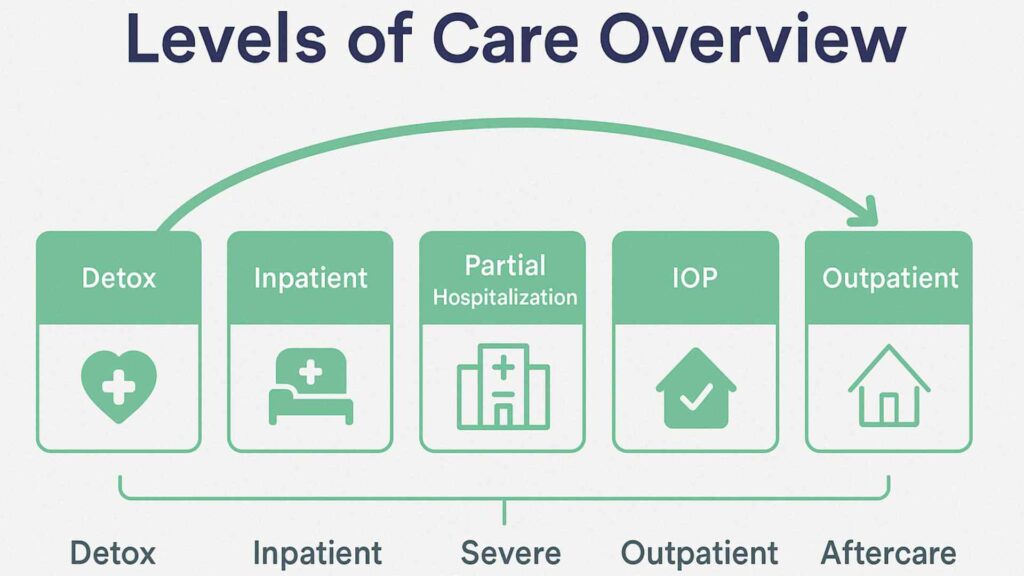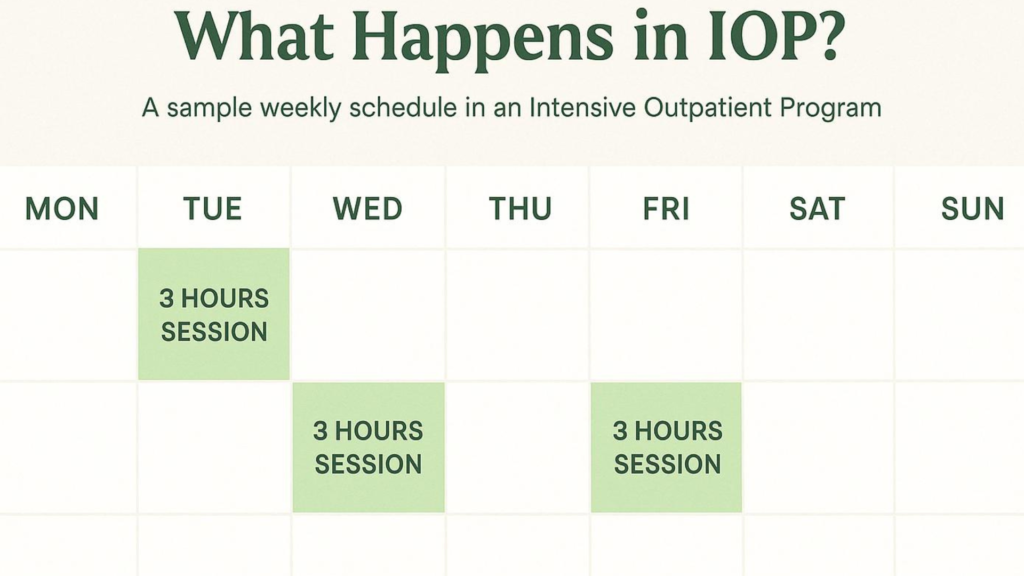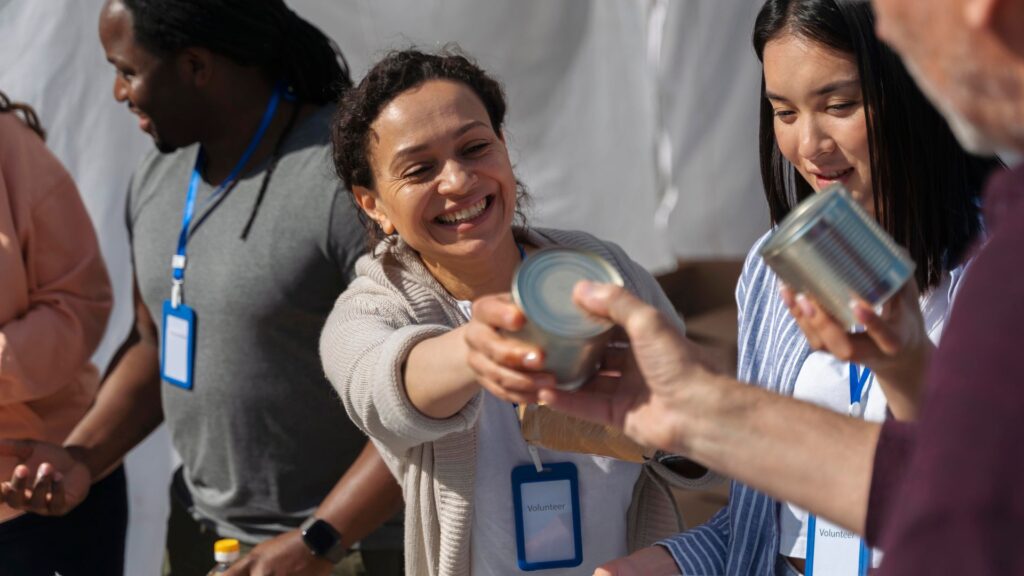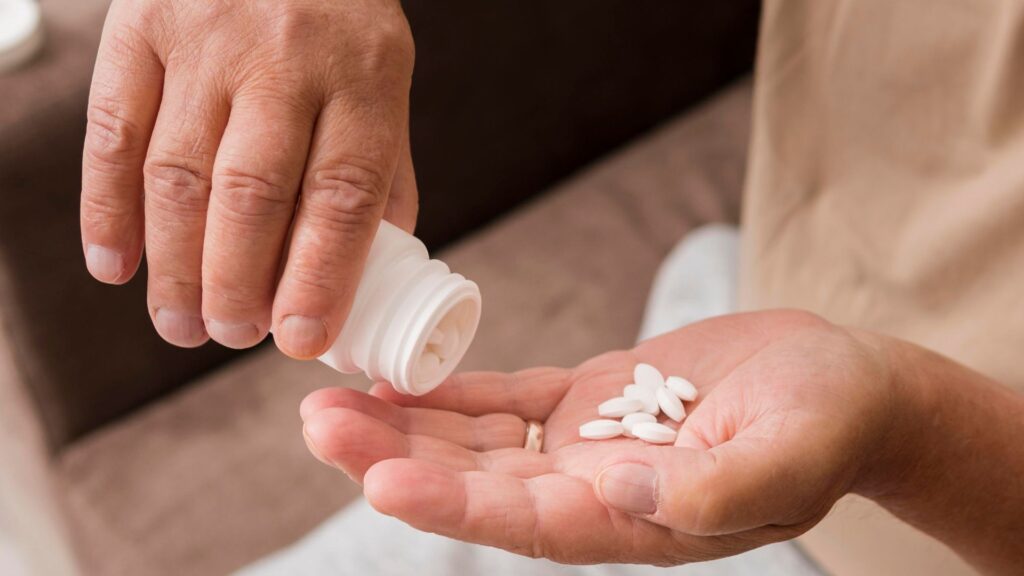
When it comes to addiction treatment, choosing the right level of care can make all the difference in your recovery journey. Two of the most common options are inpatient treatment and outpatient treatment, each with its own structure, intensity, and benefits.
While inpatient programs provide immersive, round-the-clock support, intensive outpatient programs (IOPs) allow greater flexibility. Understanding the difference between IOP vs inpatient care will help you or your loved one make the best choice for long-term success, healing, and a personalized recovery experience.
What Is Inpatient Treatment?

Inpatient treatment refers to a highly structured, residential form of care where individuals live at the facility for the duration of their program. These inpatient treatment programs offer round-the-clock care in a controlled environment, allowing clients to focus fully on recovery without outside distractions. Inpatient rehab is ideal for those who require constant supervision, medical monitoring, and a safe space to stabilize physically, mentally, and emotionally.
Key Components of Inpatient Programs
Inpatient programs are designed to offer comprehensive, whole-person care. They typically include a structured environment, medical supervision, and therapeutic interventions like individual and group therapy. Many programs also provide medication management for clients dealing with withdrawal symptoms or co-occurring mental health concerns.
Family therapy is often incorporated to rebuild trust and improve communication, making inpatient treatment a fully immersive experience that strengthens both individual and relational recovery.
Who Benefits Most From Inpatient Treatment?
Inpatient treatment is ideal for individuals facing severe addiction, unmanaged mental health disorders, or multiple relapses. It’s especially beneficial when 24/7 care is required due to medical needs, withdrawal risks, or a lack of a safe home environment.
People with co-occurring mood disorders or those without a reliable support system often achieve better outcomes in inpatient programs than in outpatient programs, making the IOP vs inpatient decision a crucial step in care planning.
What Is an Intensive Outpatient Program (IOP)?

An intensive outpatient program IOP is a structured form of addiction treatment that allows clients to live at home while attending scheduled therapy sessions throughout the week. Intensive outpatient treatment provides comprehensive clinical care—similar to inpatient treatment programs—but with added flexibility.
These intensive outpatient programs IOPs support individuals who need consistent care but can safely function outside of a residential setting with accountability and community-based healing.
Core Elements of Intensive Outpatient Programs
Intensive outpatient programs include multiple weekly therapy sessions, such as individual therapy, group therapy, and peer-based support groups. Clients also learn valuable coping strategies to manage cravings, triggers, and mental health symptoms.
With flexible hours, this treatment program allows participants to continue work, school, or caregiving while progressing through the recovery process. Program length varies, but most IOPs run several weeks, offering intensive support without full inpatient care.
Who Is a Good Fit for IOP?
Intensive outpatient care is ideal for individuals stepping down from an inpatient program or those beginning treatment with a supportive environment at home. It’s a great fit for people managing work, school, or family responsibilities who don’t need the structure of inpatient treatment programs.
Those with stable housing, mild-to-moderate mental health disorders, and motivation for change often thrive in this level of outpatient treatment and benefit from personalized, real-life recovery support.
IOP vs Inpatient: Key Differences
Choosing between an intensive outpatient program IOP and inpatient treatment depends on your needs, lifestyle, and level of risk. While both offer structured, professional addiction treatment, the setting, intensity, and time commitment differ.
Inpatient programs provide full-time residential care, while intensive outpatient programs (IOPs) allow clients to live at home and attend scheduled therapy sessions. Understanding these core differences is essential when considering inpatient and outpatient treatment options.
Comparison at a Glance:
| Feature | Inpatient Treatment | Intensive Outpatient Program (IOP) |
|---|---|---|
| Living Situation | 24/7 residential care | Live at home |
| Time Commitment | Full-time (weeks/months) | Part-time (9–15 hrs/week avg) |
| Structure & Supervision | Constant supervision | Scheduled supervision |
| Best For | Severe addiction, unstable environments | Milder cases, stable support system |
| Cost | Higher due to housing & staffing | More affordable, outpatient-based |
Level of Structure and Supervision
If you’re comparing structure in IOP vs inpatient, supervision is a major differentiator. Inpatient care offers round-the-clock care, medical monitoring, and a controlled environment for those requiring stabilization or detox.
Intensive outpatient programs provide intensive care during set hours, with the freedom to manage daily responsibilities. This balance of flexibility and accountability makes IOP a strong option for many, but it may not suit those in crisis or high-risk situations.
Treatment Settings and Daily Schedules
Inpatient programs take place in a residential treatment facility, where clients follow a highly structured daily schedule including therapy sessions, meals, medication rounds, and peer activities. By contrast, an outpatient program like IOP allows clients to return home each day. Sessions typically occur 3–5 days a week.
Typical Daily Flow Comparison:
| Time | Inpatient Program | IOP Program |
|---|---|---|
| 9:00 AM | Group Therapy | Work or Home Routine |
| 12:00 PM | Lunch in Facility | Lunch Break |
| 2:00 PM | Individual Therapy / Activities | Group Therapy Session |
| 5:00 PM | Dinner / Medication / Check-ins | Home Time or Evening Session |
Cost of Care and Insurance Considerations
One of the most practical differences is cost. Inpatient treatment typically involves higher expenses due to accommodations, staff, and 24/7 care. Intensive outpatient programs are more affordable and widely covered by insurance.
Many clients choose IOP for its accessibility and balance of structure with freedom. For those weighing outpatient treatment options, verifying coverage early helps reduce surprises and makes seeking treatment less overwhelming.
Estimated Average Costs (Without Insurance):
| Treatment Type | Avg. Weekly Cost | Insurance Accepted |
|---|---|---|
| Inpatient Rehab | $3,000–$6,000 | Yes (varies by plan) |
| IOP Program | $750–$1,500 | Yes (widely accepted) |
Mental Health and Co-Occurring Disorders
Many people seeking addiction recovery also face mental health challenges, such as anxiety, depression, or trauma. Both inpatient programs and outpatient programs address mental health issues through integrated care.
A quality treatment center will assess for any underlying mental health condition during intake, creating a plan that supports both needs. Whether in a structured environment like inpatient care or a flexible outpatient program, clients receive access to licensed professionals and behavioral health interventions that support sustainable change beyond symptom management.
Therapy Sessions in Inpatient and Outpatient Treatment
Both settings include regular therapy sessions, though the frequency and format vary. In inpatient programs, clients often attend multiple daily sessions, including individual therapy and group therapy sessions, within a fully immersive schedule.
In an outpatient program, sessions occur several times per week and are scheduled around daily responsibilities. Regardless of format, therapy is essential to uncover root causes, develop coping skills, and build emotional resilience for lifelong recovery.
Support Groups and Ongoing Support
Community is a cornerstone of effective addiction recovery. In both inpatient and outpatient treatment settings, support groups offer connection, accountability, and shared experience. After formal programming ends, many facilities provide ongoing support through alumni programs or referrals to support services like 12-step meetings.
These connections play a critical role in helping clients maintain progress, strengthen healthy routines, and build lifelong networks of people who understand the journey.
Medical Supervision and Medication Management
Access to medical supervision differs significantly between levels of care. Inpatient programs offer 24/7 monitoring and on-site medical care, which is critical for those managing withdrawal or severe substance use.
Medication-assisted treatment and medication management are more intensive in residential settings. In contrast, outpatient programs provide ongoing support through scheduled check-ins with medical providers, often coordinated with other care like behavioral therapies or psychiatric evaluations.
Inpatient vs Outpatient for Severe Addiction
When facing severe addiction or withdrawal from severe substances, a full-time inpatient program is often the safest and most effective option. These residential programs provide intensive support, medical stabilization, and protection from triggers. However, for individuals with strong external support and lower risk of relapse, an intensive outpatient program may be appropriate.
While both treat drug and alcohol addiction, inpatient care is more suitable when 24/7 supervision is needed. IOP, on the other hand, can be a powerful part of the recovery journey for those stepping down or starting from a stable foundation.
How to Choose the Right Treatment Program
Selecting the right treatment program means looking honestly at your current challenges, environment, and available resources. If you’re balancing a job, caring for family members, or dealing with mild mental health issues, an outpatient program could work. If safety or stability is a concern, inpatient care may be necessary.
All reputable treatment programs should assess your medical history, level of risk, and emotional readiness to determine whether a treatment center offering outpatient care or more structured support is the right step forward in your addiction recovery.
Questions to Ask a Treatment Center
Before choosing a program, ask about the treatment settings, treatment duration, therapy styles, and how they support your coping skills. It’s also worth exploring whether they offer partial hospitalization programs, regular outpatient treatment, or both.
Look for facilities staffed by licensed mental health professionals and experienced in treating substance abuse, mental health, and dual diagnoses. Most importantly, choose a place that considers your recovery process unique.
Decision Guide Chart: What to Ask Before You Commit
| Key Area | What to Ask |
|---|---|
| Level of Care | Do you offer inpatient, outpatient, or both (inpatient and outpatient services)? |
| Support Scope | Will I have access to mental health and addiction treatment? |
| Staff Credentials | Are services provided by licensed mental health professionals? |
| Family Involvement | Can family members participate in family therapy? |
| Structure & Flexibility | How does your treatment duration and schedule fit with my responsibilities? |
| Follow-Up Services | What kind of outpatient services or ongoing support do you offer after treatment? |
The Role of Family Members in Recovery
Family members play a crucial role in the healing process. Involving loved ones in family therapy sessions can strengthen communication, rebuild trust, and help families better understand the nature of addiction.
Whether someone is in an inpatient or outpatient setting, their recovery is more sustainable when those closest to them are part of the journey—offering emotional support, accountability, and stability during one of the most important transitions in life.
Transitioning Between Inpatient and Outpatient Care
Recovery often includes movement between levels of care. Step-down programs like partial hospitalization programs bridge the gap between inpatient and outpatient services. This transition phase supports individuals who no longer need 24/7 care but still require structure and support.
A well-planned shift between inpatient and outpatient treatment allows for continued progress, reducing the risk of relapse while reinforcing the skills and mindset developed during higher levels of care.
Your Recovery Journey: What to Expect
Every person’s recovery journey is unique, but the full spectrum of addiction treatment often begins with detox, followed by inpatient treatment, and then progresses to an intensive outpatient program or outpatient care.
At each stage, clients gain new coping skills and insights to navigate life in sobriety. A qualified treatment center will design a personalized plan that evolves with your progress—ensuring you receive the right support at every turn of your recovery journey toward lifelong freedom.
Which Treatment Model Fits Your Life Best?
Beyond clinical differences, choosing between inpatient rehab and an intensive outpatient program is about lifestyle compatibility and personal readiness. This chart helps you evaluate how each option aligns with your current stage in the recovery journey, home environment, and long-term goals. It reframes IOP vs inpatient from the perspective of real-world application—not just structure.
| Decision Factor | Inpatient Rehab | Intensive Outpatient (IOP) |
|---|---|---|
| Can you step away fully? | Yes, full-time care needed | No, need to maintain work/school/home |
| Do you need daily monitoring? | Yes, 24/7 inpatient treatment required | No, able to self-manage with support |
| Family support at home? | Limited or none | Strong support system in place |
| Transitioning from detox? | Ideal next step | Suitable after inpatient or PHP |
| Focus of care | Stabilization and intensive healing | Reintegration and real-life application |
Choosing Your Next Step for Addiction Treatment with Confidence
Whether you’re considering outpatient rehab, intensive outpatient care, or simply need help deciding where to begin, the most important step is reaching out. At Abundance Treatment, we provide compassionate, personalized support to help you build a strong foundation for lasting recovery.
You don’t have to do this alone. If you’re seeking treatment, contact us today to learn how our outpatient programs in Toledo can support your recovery journey—because healing begins the moment you ask for help.




































